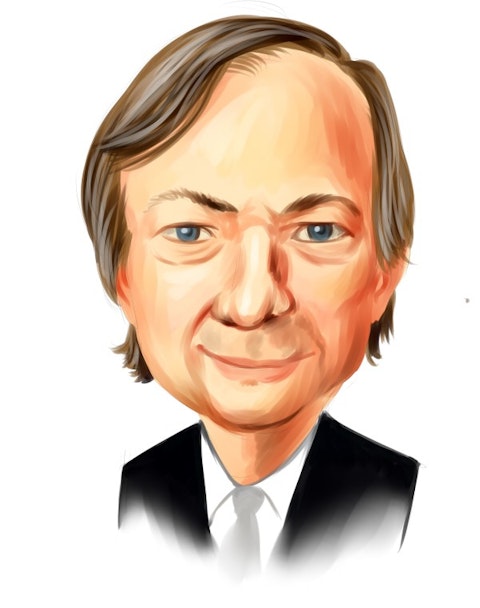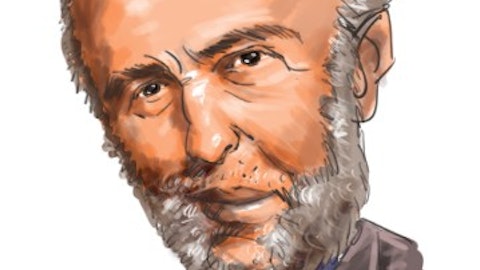
Best Buy Co., Inc. (NYSE:BBY) was Bridgewater’s 11th largest 13F holding at the end of 2Q following a 350% increase over that period. Dalio quickly fell out of love with the big box retailer and dumped all of its shares last quarter. Best Buy was down 15% during 3Q, and continues to see earnings pressure from online retailers amid a less-than-stellar economic backdrop. With a forward P/E of just over 5x, we are cautious that investors could fall into a value trap. Best Buy also has an attractive dividend, yielding 5.6%, but the retailer has seen its cash position drained by 85% over the past year, and free cash flow generation is slowing.
From a broader perspective, consumer electronics purchases are seeing a fundamental shift that is moving to the online landscape. This shift has already pushed one retailer completely out of business – Circuit City – and has many investors not too optimistic on what the future will bring. Founder Richard Schulze’s interest in the company appears to have little bearing on reassuring investors that there is sustainable value in Best Buy’s business model (see Are Hedge Funds Hoping For a Best Buy Takeover?)
The retailer saw Schulze show potential interest in exploring a buyout between $24-$26 a share, which held up the stock for a short time. After weak 3Q results, shares fell as low as $12, and Schulze lowered his potential offer price to $20. Billionaire David Einhorn – founder of Greenlight Capital – was another top fund manager selling off his entire stake in Best Buy last quarter (check out David Einhorn’s newest stock picks).
Symantec Corporation (NASDAQ:SYMC) was another one of Dalio’s selloffs in 3Q. Symantec is a software security company with projected FY2013 revenue growth of only 1%. Its long-term growth also remains near the low end of the industry at an 8% compounded annual growth rate, far below notable competitor CommValut Systems (23%). While Symantec appears cheap at 11x earnings, its growth outlook places it at the bottom of the industry and justifies its subpar metrics. Symantec is also heavily reliant on large-sized contracts, which are becoming harder to find in an increasingly tight fiscal environment.
Applied Materials, Inc. (NASDAQ:AMAT) is the world’s largest manufacturer of water fabrication equipment for the semiconductor industry. Dalio found little reason to stay invested in the company and sold off all his shares on the back of expectations that Applied would see FY2013 sales down 10%, following a 17% decline in 2012. Applied posted 3Q earnings results of $0.06, down from $0.21 year over year. This drop comes on a sharp decline in chip equipment revenues, and weakness in many of Applied’s other segments as well. We believe there are better investments in the semiconductor industry, mainly due to a continued expected decline in flat panel displays, and uncertainty in the solar industry. Applied’s long-term EPS growth rate (9%) is well below other investment opportunities in the space – the industry’s average is 15%.
Eaton Corp PLC (NYSE:ETN), the power management company, saw lackluster results last quarter due to weakness in the U.S. and Asian markets. The industrial company’s 3Q results came in at $1.07, just below $1.08 from one year earlier. The diversified power management company has six segments, but its geographical concentration will likely continue to cause weakness in the interim. One of its key segments – Hydraulics – is especially feeling the pressure from the Chinese slowdown. The company’s high-profile acquisition of Cooper Industries for nearly $12 billion also looks to further drive its 50.0 debt-to-equity ratio even higher. In our opinion, some of the industry giants such as Honeywell and ABB Ltd, have better wherewithal to navigate continued industry weakness.
Intel Corporation (NASDAQ:INTC) is another big dividend paying stock – a 4.3% yield – which hedge funds are quickly falling out of love with. Intel is down almost 15% year to date given an uncertain future for PC demand. The onslaught of market share infringement by smartphones and tablets has caused recent downward revisions for next year’s EPS; consensus is now 15% lower than it was three months ago. This large-cap tech giant might be another value trap – much like Best Buy – where it trades at 9x forward earnings and boasts a 0.8 PEG. We cautious the use of these metrics might be compromised due to Intel’s lowered expectations next quarter, and continued weakness in developed markets. Intel also saw billionaire Steven Cohen and SAC Capital sell off a massive portion of their shares last quarter (check out Steven Cohen’s other moves).
To recap: we believe that Ray Dalio has seen fundamental consumer preference shifts tear away the product demand for a couple companies he owned, causing him to adjust accordingly. The 3Q selloff of Best Buy comes as shoppers move to an online purchase preference, and the Intel selloff comes as customers shift from PCs to tablets and smartphones. Acquisitions by Symantec and Eaton might have been mistimed and mispriced, where Symantec purchased Verisign’s security software business, but industry demand is moving toward hardware purchases and away from software. Eaton’s rich purchase might overload the company with debt, and Applied is simply facing pressure from an ever-changing tech market that cannot seem to generate any sustainable demand for solar panels. To continue reading about Ray Dalio in the news, check this out, or visit his profile page on Insider Monkey.




